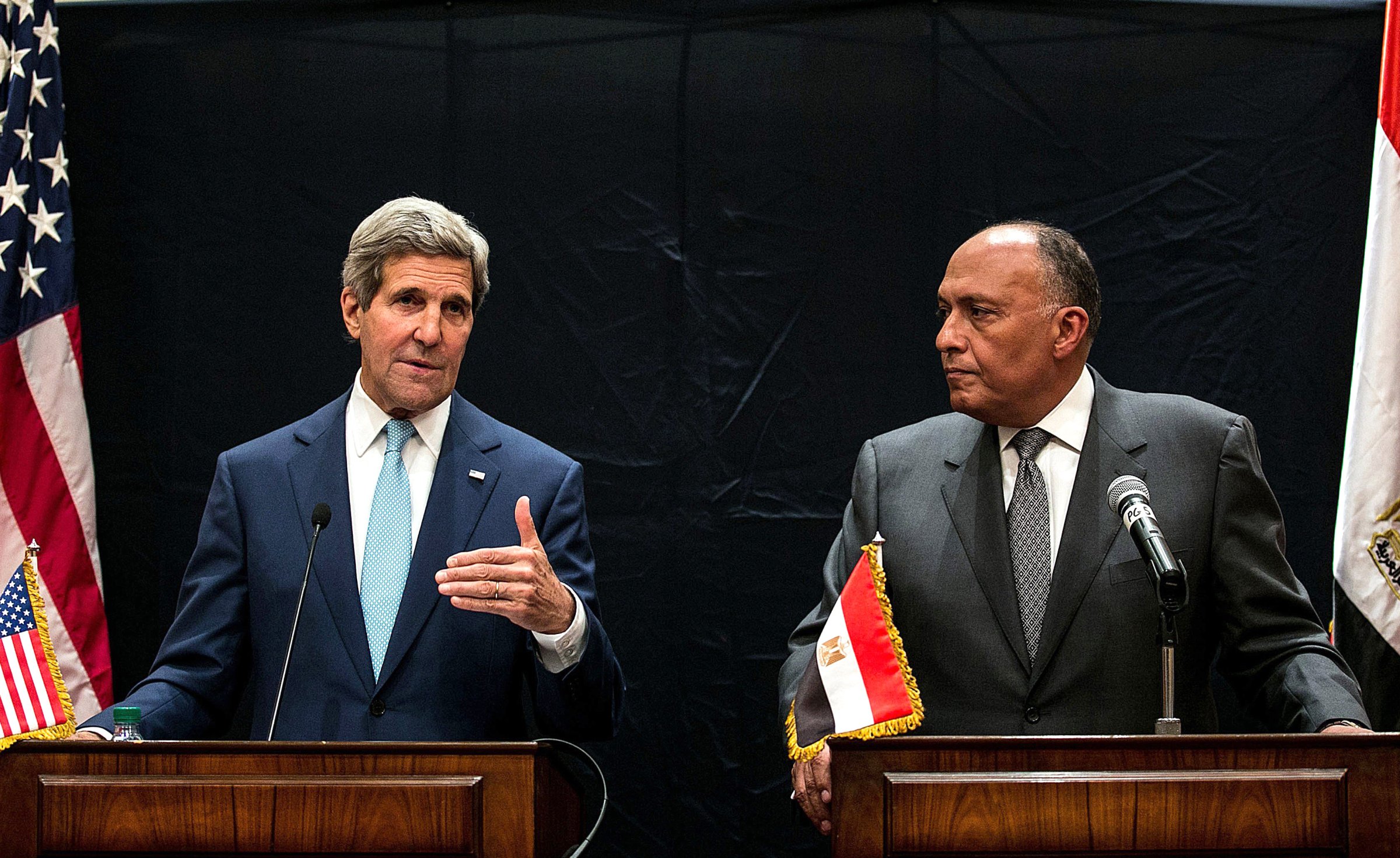
You’ll be hearing a lot in the coming days about John Kerry’s visit to Baghdad Monday, where the Secretary of State held meetings with Iraqi Prime Minister Nouri al-Maliki and other leaders in an effort to prevent the country’s explosion into a new sectarian civil war. But Washington has limited influence in Baghdad, and it’s not clear what Kerry’s visit can accomplish.
That’s why it’s worth focusing on Kerry’s earlier stop in Cairo, which was more revealing about U.S. policy in the region. After his Sunday meeting with Egypt’s military ruler Abdul Fattah al-Sisi, he signaled the Obama Administration wants to fully restore U.S. military aid to Cairo—choosing the priorities of influence and stability in Egypt over a principled defense of human rights under a government that a top U.S. Senator recently branded “a dictatorship run amok.”
That’s a retreat from Obama’s earlier, and half-hearted, punishment of al-Sisi’s repressive regime, which has showed no signs of moderation. To the contrary: Hours after Kerry left Cairo, an Egyptian court convicted three Al Jazeera journalists and 15 others people for alleged collaboration with the Muslim Brotherhood. That prompted Kerry to issue a statement from Iraq denouncing the “chilling, draconian” sentences.
“Egyptian society is stronger and sustainable when all of its citizens have a say and a stake in its success,” Kerry said in a statement. “Today’s verdicts fly in the face of the essential role of civil society, a free press, and the real rule of law.”
Kerry’s trip to Egypt was the clearest statement yet that President Barack Obama would rather work with al-Sisi than punish him, and his conciliatory words in Cairo before the verdict were not surprising, says Tamara Cofman Wittes, a former State Department official and Egypt expert now with the Brookings Institution. “I think the trajectory has been clear for a while.”
Meeting with reporters in Cairo, Kerry said he and al-Sisi discussed their “mutual determination for our countries to work together in partnership in order to deal with the challenges that we face.” Kerry also noted America’s support for political freedoms and “a vibrant civil society.” But his overall tone was supportive of the military general who led the July 2013 coup against Egypt’s Islamist Muslim Brotherhood government and was elected the country’s president this month.
Put an asterisk after “elected,” though. Sisi won in a phony “campaign” carefully restricted by his military regime with a comical 97 percent of the vote. That tells you a lot about the nature of Egypt today: a politically repressive dictatorship which has banned its main political opposition, the Muslim Brotherhood, and wantonly imprisons its critics. Once home to the stirring mass protests on Tahrir Square, Egypt now quashes virtually all political dissent.
Last fall, the White House announced a partial suspension of the $1.5 billion in U.S. military aid Egypt receives each year, an enduring legacy of the country’s 1979 peace deal with Israel. Even at the time, an Obama official explained that the suspension “is not meant to be permanent; this is meant to be the opposite.” (The Obama Administration never officially recognized al-Sisi’s seizure of power as a coup; doing so would have automatically triggered a full aid cutoff under U.S. law.)
That move didn’t exactly prompt moderation from al-Sisi. His crackdown against Islamists continued, punctuated by a court’s recent death sentences for a Muslim Brotherhood cleric and 182 of his supporters who were accused of inciting violence that killed a single police officer.
But Obama wants to maintain a strong relationship with Cairo, not least for strategic reasons like access to the Suez Canal, and U.S. officials believe that continued military aid buys us influence over the country’s future. The U.S. also has little love for the Muslim Brotherhood, which, although it governed peacefully, has radical Islamist elements and allies.
And so, speaking to reporters in Cairo, Kerry explained that the Obama Administration supports fully restoring U.S. aid to Egypt—despite a recent move by Democratic Vermont Sen. Patrick Leahy oto chop $650 million from America’s annual aid package and halt the shipment of 10 Apache attack helicopters the Egyptians say are vital to battling militants in their Sinai region, a goal very much shared by Washington.
“We will work that out, and I am confident that we will be able to ultimately get the full amount of aid for precisely the reasons that I describe—because it is strategic and it is important for us to be able to work together,” Kerry said, adding that he had spoken to Leahy from Cairo. “I am confident… that the Apaches will come and that they will come very, very soon.”
Unfortunately, the same probably can’t be said for political reform in Egypt, which Wittes calls essential to reforming Egypt’s shattered economy, currently propped up by billions in aid from Gulf Arab states, like Saudi Arabia and the UAE, which are hostile to the Muslim Brotherhood.
“It’s very hard to see how with [al-Sisi] could make the really painful economic choices needed to revitalize Egypt’s economic growth, and address the needs of Egypt’s young men without broader political support,” says Wittes. “You cannot separate the economics from the politics.”
And with the U.S. aid spigot likely to reopen in full, it’s also hard to see what might make al-Sisi seek that broader support.
More Must-Reads from TIME
- Inside Elon Musk’s War on Washington
- Meet the 2025 Women of the Year
- The Harsh Truth About Disability Inclusion
- Why Do More Young Adults Have Cancer?
- Colman Domingo Leads With Radical Love
- How to Get Better at Doing Things Alone
- Cecily Strong on Goober the Clown
- Column: The Rise of America’s Broligarchy
Contact us at letters@time.com